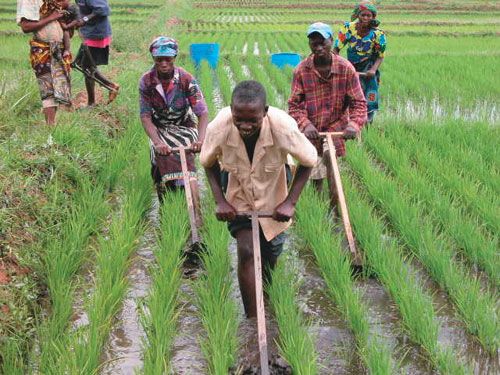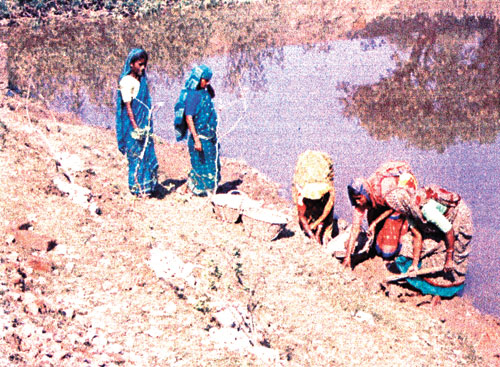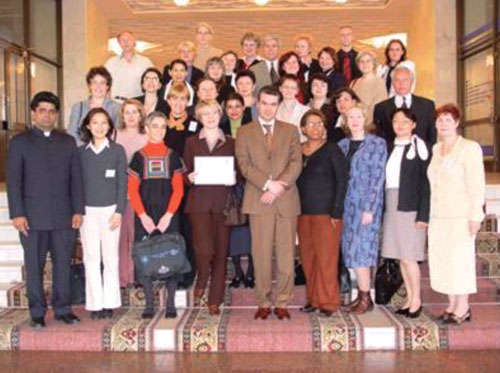Japan's Official Development Assistance White Paper 2005
Box II-3. For Gender Equality and Empowerment of Women: Examples of Japan's Assistance

Tanzania- "Kilimanjaro Agricultural Training Centre (KATC) Project Phase II" (JICA)
The main purpose of this project is to improve the productivity of irrigated rice farming through training programs for farmers and people promoting the spread of agriculture. The project incorporates the perspective of gender into the contents of the training program. The two aims of the program are to (1) achieve a fare division of labor among men and women in production (activity with a market value) and reproductive activities (household duties and activities other than production) and, (2) grant all men and women equal access to and management over household income and expenditures.
As for specific initiatives, focus was placed on alleviating the heavy workload of women who were engaged in both household duties and agricultural work, such as collecting firewood and weeding fields, by promoting the adoption of improved heat-efficient furnaces and simple weeding machines. Following the adoption of weeding machines, men began to actively help with the weeding. As a result, this kind of technology allows men and women alike to reduce their burdens and work time, allowing them to devote the labor saved to other activities. Moreover, along with gender training designed to raise awareness of male/female inequality, household budget training was also conducted in order to allow men and women to manage the household budget together. As a result of these initiatives, agricultural technology was set in place, with the additional effect of raising the eagerness to work of both men and women. This, in turn, has led to an improvement in the productivity of rice farming, which was the objective of the project.

Bangladesh- "Eastern Bangladesh Rural Infrastructure Development Project" (JBIC)
The main purpose of this project is to improve infrastructures, such as roads and village market facilities for impoverished rural areas in Eastern Bangladesh, with an aim to rectifying the economic and social disparities between urban and rural areas. The participation of women in this project was encouraged, as implementing this initiative will lead to the economic empowerment of impoverished women.
Specifically, in order for impoverished women to be involved in the afforestation and shrub cultivation necessary to reinforce the road berms following the road construction, impoverished women are being organized into groups with the assistance of NGOs, and the necessary technological training programs for the afforestation work are being implemented. The project is expected to employ approximately 2,500 impoverished women for a two year period. Part of the payment for the employment period will be secured in deposits, with training being conducted in how to use the funds for opening businesses. Moreover, as for improvements in the village market facilities, a women's section was set up within the market and support offered for the business operations of female proprietors in the local community, which is currently dominated entirely by male retail store proprietors. It is expected that the expansion of revenue opportunities for impoverished women in rural areas through such initiatives will lead to the reduction of poverty in rural areas.

"Gender Sensitive Budgeting (GSB) Planning Assistance" (UNDP Partnership Fund)
This program analyzes the different effects on men and women that the formulation of government budgets has and supports capacity-building on the part of the governments of various countries for the sake of GSB in planning, implementing, and evaluating budgets designed to lead to gender equality. In regions such as Europe, CIS, and Asia-Pacific GSB training courses have been held for approximately 90 specialists and government officials involved in policy planning and implementation. Specialists who have received this training are promoting programs to implement GSB substantively in Nepal, Russia, Bosnia, and Tajikistan. For example, in Nepal the Ministry of Finance has convened a committee on GSB and intensified audit work on GSB. With the cooperation of the United Nations Development Fund for Women (UNIFEM), aid to bolster GSB in local budgets has begun in Russia. GSB is an effective support system to promote gender equality, and it is expected that initiatives in these countries will continue to be followed up and applied in other countries.


 Next Page
Next Page